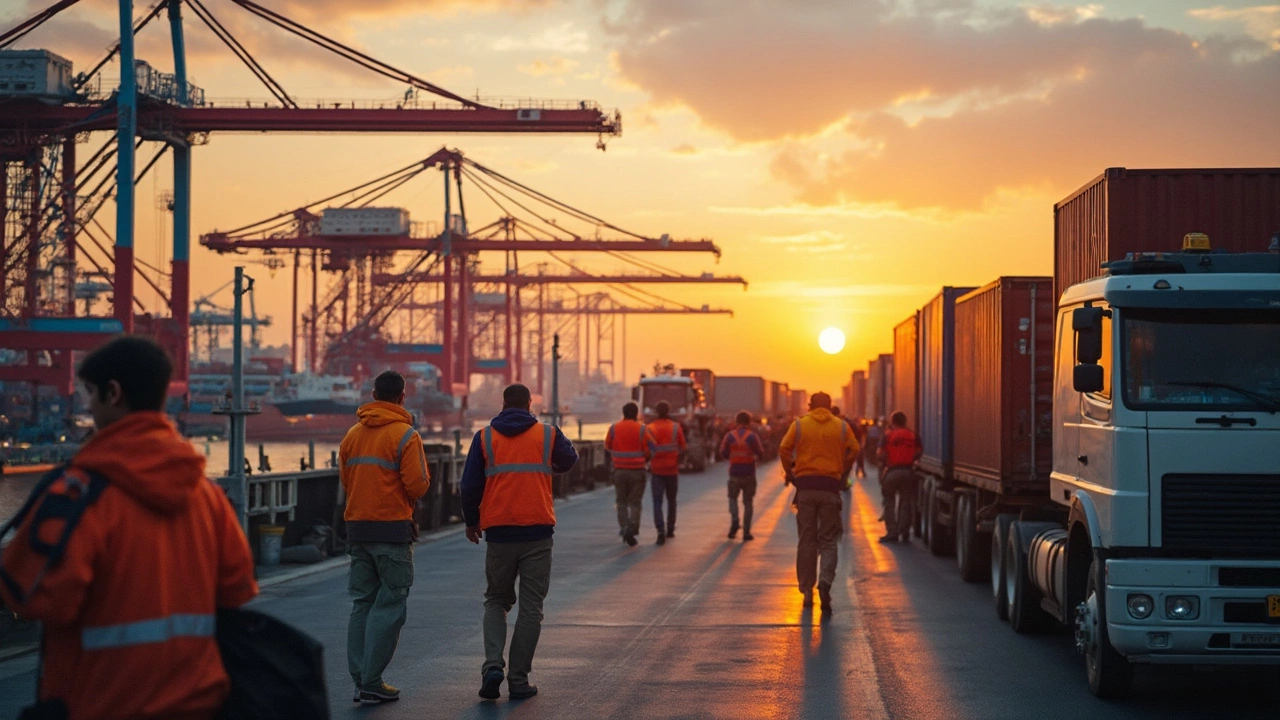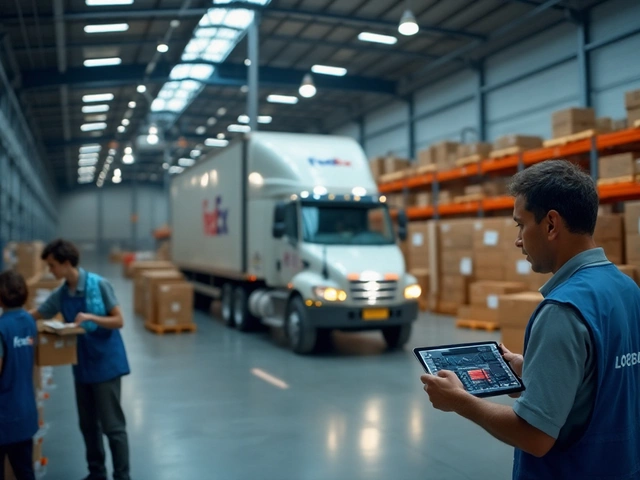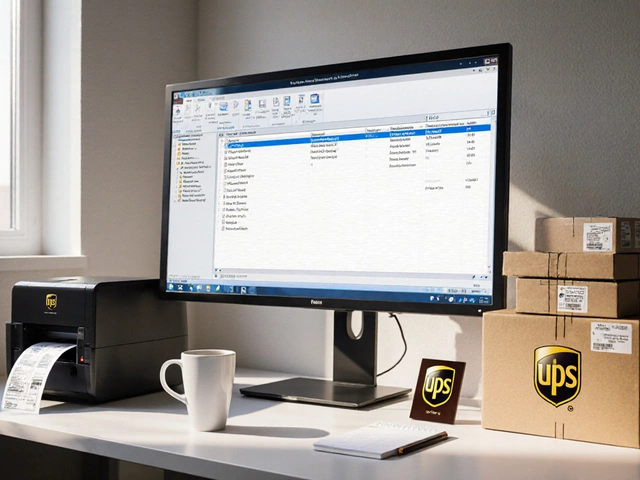Ever wonder how your latest gadget, fresh fruit, or even a batch of sneakers manages to arrive from the other side of the world right on time? It’s not magic. There’s a whole network making sure things don’t get stuck in customs, lost on a dock, or buried under mountains of paperwork. That's where freight forwarding comes in.
Freight forwarding isn’t about owning ships, airplanes, or trucks. It’s about managing all the behind-the-scenes stuff that gets your cargo from here to there—choosing the best routes, handling documentation, keeping tabs on schedules, and making sure nothing gets snagged by rules at the border. These folks coordinate with airlines, shipping lines, trucking companies, and warehouses so you don’t have to juggle a million moving parts yourself.
If you’re running a business that depends on shipping, or just curious about how international trade works, getting a handle on freight forwarding is a solid move. It means less chance of your goods getting stuck, lost, or delayed. And if you’re thinking about expanding into global sales, knowing this stuff is half the battle won.
- What Does a Freight Forwarder Actually Do?
- How the Process Works (Step by Step)
- Why Use a Freight Forwarder?
- Tips for Picking the Right Freight Forwarder
What Does a Freight Forwarder Actually Do?
Okay, so what’s the real job of a freight forwarder? These folks act like your personal shipping manager. They don’t move the goods themselves, but they organize the whole journey from factory to doorstep, making sure nothing gets lost or stuck. The main goal is to move cargo efficiently, legally, and at the lowest possible cost.
Here’s what a freight forwarding company does, step by step:
- Booking Cargo Space: They reserve space for your goods on ships, planes, trains, or trucks—often getting better deals because they move a lot of stuff.
- Documentation: Customs declarations, bills of lading, packing lists, certificates of origin—the paperwork pile is huge, but it’s all sorted by your forwarder.
- Customs Clearance: They work through all the international and local rules, so your stuff won’t get stuck at some random border.
- Tracking Shipments: You’ll get updates and tracking info. If something gets delayed, the forwarder sorts out rerouting or alerts you about changes.
- Insurance: If your cargo needs protection, they’ll suggest and sort out insurance options to cover any damage or loss.
- Warehousing: Need temporary storage? Many offer short-term warehousing, so your goods are safe between stops.
Ever heard the stat that 90% of global trade moves by sea? That’s a lot of containers. Freight forwarders are the key players getting those boxes on and off ships, and connecting them with trucks and trains on land.
| Task | Who Handles It | Common Issues Avoided |
|---|---|---|
| Booking and Transportation | Freight Forwarder | Overpaying, missed space deadlines |
| Customs Documentation | Freight Forwarder | Delays, fines |
| Insurance Arrangements | Freight Forwarder | Uncovered damage or loss |
| Tracking and Updates | Freight Forwarder | No info on delays |
| Temporary Storage | Freight Forwarder / Partner Warehouses | Damage, theft |
Think about it like this—a good freight forwarder is your insurance policy against shipping headaches. They’re the shortcut through the maze of global trade, making sure your products land where and when they’re supposed to.
How the Process Works (Step by Step)
Managing international shipments sounds complicated, but the process is pretty straightforward when you break it down. Here’s the real-world path your products follow with a freight forwarding partner steering the ship:
- Quote and Booking: First, you ask the forwarder for a quote based on your cargo details. They check the size, weight, and destination, then suggest the best transport options (air, sea, or land). Once you agree, they book the space with carriers.
- Pick-up and Export Handling: They arrange for your goods to be picked up—could be straight from a factory or a warehouse. Here’s where export paperwork and packaging standards matter, so nothing gets bounced at the port or border.
- Customs Clearance (Export): The forwarder makes sure all export customs rules are met. This step can be a major pain if you’re not careful, so having the right documents is crucial.
- International Shipping: Now, your cargo hits the road, air, or water. Forwarders keep an eye on everything using tracking systems, sharing updates and ETA changes with you.
- Customs Clearance (Import): When goods reach the destination country, it’s customs time—again. Forwarders handle the mountain of import paperwork and help pay any required taxes or duties.
- Inland Transportation and Delivery: Once cleared, the forwarder arranges for the goods to be delivered to the final spot—whether it's your warehouse or even direct to the customer, if needed.
Want some context? Take a look at this breakdown of typical timelines for different shipping modes:
| Mode | Avg. Transit Time (Days) | Best For |
|---|---|---|
| Air Freight | 1-7 | High-value, urgent cargo |
| Sea Freight (FCL) | 20-45 | Large quantities, cost-saving |
| Sea Freight (LCL) | 25-50 | Smaller loads, flexible schedules |
| Road Freight | 1-10 | Regional, door-to-door |
A pro tip: Always double-check the paperwork and timelines with your forwarder at each stage. Missing forms or delays in customs are the biggest reasons shipments get stuck. If you know the roadmap, you’ll be able to spot snags and sort them out quickly.

Why Use a Freight Forwarder?
If you’ve ever tried to set up an international shipment by yourself, you know it can turn into a nightmare fast. Here’s the deal: using a freight forwarding expert saves you from most of the mess. These pros deal with confusing customs rules, endless paperwork, and tight shipping deadlines every day. Honestly, they’ve seen situations you don’t even want to imagine—like cargo stranded at a port because of a single missed stamp, or containers rerouted halfway around the globe due to a paperwork hiccup.
Freight forwarders are well-connected. They use a big network of carriers—shipping lines, truckers, air freight companies—to find faster or cheaper options than you’d track down on your own. For small and medium-sized businesses, this can mean the difference between on-time deliveries and angry customers waiting weeks for their stuff.
- Customs know-how: Most hang-ups happen at the border. Freight forwarders know exactly how to fill out and file tons of documents, from Bills of Lading to customs declarations. They duck the costly fines and delays that catch new shippers off guard.
- Risk reduction: Shipping overseas comes with surprises—lost cargo, accidents, strikes, or even weather disasters. Freight forwarders keep your goods insured and help solve problems fast if things go sideways.
- Time and cost savings: Hassling with rates, booking shipments, tracking, and following up with multiple companies burns hours. Forwarders handle this and score better deals thanks to their shipping volumes.
- Tracking and transparency: Most offer online tracking systems, so you always know where your cargo is. Amateur shipments? You’re left refreshing your email and hoping for updates.
Check out some numbers that show the impact:
| Benefit | Typical DIY Outcome | With Freight Forwarder |
|---|---|---|
| On-time Delivery Rate | ~80% | 95%+ |
| Customs Delay (per 100 shipments) | 20 | 3 |
| Average Shipping Cost (per container, US-China) | $2,450 | $2,150 |
| Lost or Damaged Shipments (per 1,000) | 7 | 2 |
Freight forwarders turn a massive, international headache into something as easy as tracking a pizza delivery. If speed, reliability, and saving cash sound good, that's why people use them.
Tips for Picking the Right Freight Forwarder
The freight forwarding world isn’t a “one size fits all” thing. If you pick the wrong partner, you could end up with lost shipments, delays, or higher costs. Here’s what to look for so you don’t get burned—these tips will save you money, time, and a whole bunch of headaches.
- Freight forwarding experience really matters. Go for a company with a track record in your industry or shipping route. For example, someone shipping electronics across the Pacific needs a forwarder who’s handled that exact trade lane and cargo type before.
- Licenses aren’t just paperwork—they’re proof your freight forwarder is legit. In the U.S., they need to be registered with the Federal Maritime Commission (FMC) for ocean shipments, and hold an International Air Transport Association (IATA) license for air cargo.
- Ask about their global network. Good freight forwarders work with lots of trustworthy agents and warehouses around the world, so your cargo doesn’t get stuck if there’s a problem.
- Clear communication separates the pros from amateurs. You want someone who picks up the phone, answers emails fast, and gives honest shipping times—not just what you want to hear.
- Don’t skip looking up reviews or references. A quick search or phone call can tell you if the company delivers on promises or leaves clients hanging.
Cost matters, but don’t get tunnel vision on the lowest price. Sometimes you pay extra for customs help, tracking, or insurance—and that can be worth it. Here’s what real-world prices look like, on average:
| Route | Type of Cargo | Average Forwarding Fee (2024) |
|---|---|---|
| Shanghai to LA | Standard Container | $400 - $700 |
| Hamburg to New York | LCL Electronics | $250 - $500 |
| Sydney to Singapore | Perishable Goods | $500 - $900 |
According to the International Federation of Freight Forwarders Associations (FIATA), “Strong relationships with reliable freight forwarders are critical—especially when disruptions hit the supply chain.”
“You need a forwarder who can fix things fast when the unexpected happens—delays, strikes, customs issues, you name it.” – Logistics Management Magazine, 2024
The bottom line: check their paperwork, global reach, and communication skills before signing any contract. Make sure they can move the goods you need, on the routes you care about, and handle trouble without leaving you in the dark.





